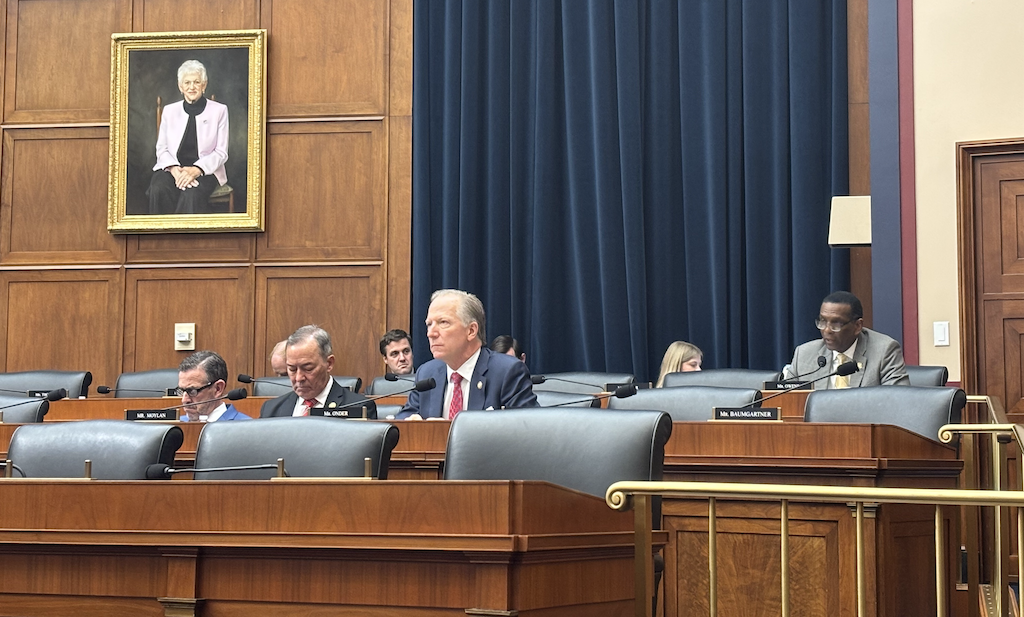WASHINGTON – On Wednesday, the House Committee on Education and Workforce passed two Republican bills examining gender and sexuality in public K-12 schools.
Committee members debated and voted on the Say No to Indoctrination Act, sponsored by Rep. Burgess Owens, R-UT, and the PROTECT Kids Act, sponsored by Chairman Tim Walberg, R-Mich.
“Republicans are committed to protecting children from the radical gender ideology taking root in our classrooms,” said Chairman Walberg in his remarks to the committee. “For too long, schools have subjected students to a left-wing agenda that subverts parents’ role in their child’s wellbeing and distracts from what teachers are meant to do: teach.”
Former teacher, Rep. Jahana Hayes, D-Conn. criticized her Republican colleagues for trying to define the narrative about what is happening in schools without being educators themselves.
“What teachers are doing is making sure all students are protected, are included, but no one is indoctrinating or coaching or encouraging students to change their gender markers. It just doesn’t happen at schools,” said Hayes.
These two bills reflect the divide between Republicans and Democrats over gender issues in schools.
The Parental Rights Over The Education and Care of Their Kids Act would require all public elementary and middle schools to have consent from a parent or guardian before changing students’ gender markers, pronouns or preferred names on any school documents. This also includes changing children’s sex-based accommodations for locker rooms or restrooms.
“I believe parents ought never be left out of important conversations about their children. About 21,000 schools have policies allowing or requiring school officials to help a student transition genders while keeping it a secret from his or her parents. That’s a travesty,” Walberg said.
One of the co-sponsors of this bill is Republican Representative Kevin Kiley from California.
During the session, Rep. Kiley mentioned how local schools purposely keep information about students from their parents.
“Let’s just look at what’s happened in my state of California,” said Kiley. “We have many documented cases of a parent confronting the school, and the school or personnel lying about it and even fabricating and doctoring documents changing the child’s names on assignments that were handed in.”
The state of California is currently under investigation by the U.S. Department of Education for its alleged violations of the Family Educational Rights Privacy Act due to a state bill passed in July that makes it illegal to force teachers and staff to tell parents about student gender identity changes.
In a statement given to members of the committee urging them to vote against the two Republican bills, the National Education Association said this bill specifically would require teachers, school counselors, nurses and other school personnel to “out transgender and nonbinary students, without knowing what the repercussions might be.”
The committee voted 18 to 12, along party lines, to send this bill to the House floor.
The other gender education bill, which was also approved by the committee 18-12, would prevent the use of federal education funds to teach topics related to gender ideology. Rep. Owens, who introduced the bill, said it would codify President Donald Trump’s Jan 20 executive order that says the U.S. will solely recognize two genders: male and female.
“Unfortunately, in recent years, too many schools have begun teaching a radical view of gender,” said Owens, in the committee session. “They decide instead of focusing on success creation through proficiency in reading, writing, math and attendance of our American culture, they instead prioritize the teaching of multiple genders.”
Rep. Mark Takano, D-Calif, brought up the 1978 Briggs Initiative proposition that would have stopped LGBTQ+ teachers from working in California schools.
“It was believed, at the time, that gay teachers were a risk to students, which is the same principle that my colleagues are implying here today,” said Takano.
Takano, who identifies as gay, said his experience as a student and a teacher shows this is not the case.
“Public school did not make me gay. God made me gay. Public school made me a teacher and a congressman. Public School opened my eyes to possibilities for my future, and it gave me access to role models. It gave me a chance to learn, to find my passion and to thrive.”

